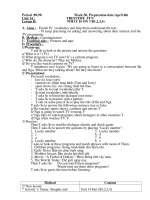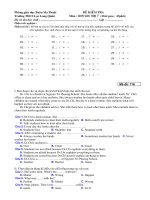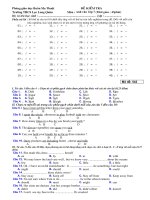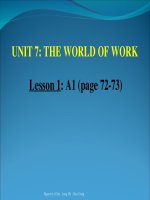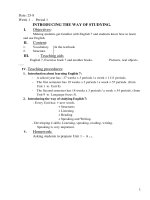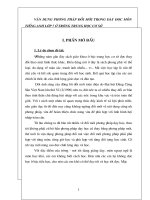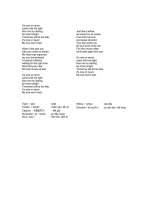anh van 7 u11-13
Bạn đang xem bản rút gọn của tài liệu. Xem và tải ngay bản đầy đủ của tài liệu tại đây (219.31 KB, 19 trang )
English 7 Đặng Thi Kim Vy
Period 76
Preparing date : 01/02/2010
Teaching date: 03/03/2010
Unit 12: Let’s eat!
B/ Our food ( B1, B4, R )
I/ Objectives.
By the end of the lesson, the students will be able to speak about food that is
caused the disease.
II/ Language contents.
1, Vocabulary: terrible, probably, dirt, sick.
2, Structures:
It must be
It was probably
Make somebody do something.
III/ Technique : explaination , pair work, group work
IV/ Teaching aids.
- Make a plan.
- Prepare a book, a tape, a cassette- player and pictures of the dialogue.
V/ Teaching produces.
Teacher’s and students’ activities Contents
1. Warm up
- T asks students to take part in a recipe-
writing competition for rice cooking by
working in groups, using the verbs and
structures you have learned. In 5 minutes,
which group complete the recipe most
quickly, will be winner.
Go around the class to help the students,
and then give them the recipe
2. Presentation.
- Ss look at part B
1
(page 119) and guess.
? Where is Ba ?
? Can you guess what’s wrong with him ?
? You now tell me what causes
stomachache ?
- Introduces : you are going to listen to the
conservation between Ba and the doctor at
the surgery. Ba had an awful stomachache.
You listen and answer the question :
? Why did Ba have a stomachache ?
- T explains words and phrase words.
- Ss listen and repeat in chorus and
individual.
- T asks Ss to make sentences with words,
The recipe: First, you put water in the pot
and boil it. Next let it boil 5’. Finally serve
it.
I. Vocabulary
- dirt (n) : bụi bẩn
- probably (adv) có thể, có lẽ
- terrible (adj) : kinh khủng
- sick (adj) : ốm , đau
II. Grammar
Cấu trúc phỏng đoán:
-It must be chắc chắn là
-It’s probably chắc có thể là
-Make somebody do something: bắt ai đó
làm gì, làm ai đó thế nào
Ex. It must be something you ate.
It was probably the spinach.
That dirt can make you sick.
Cấu trúc khác:
Have and awful headache : bị đau bụng
English 7 Đặng Thi Kim Vy
structures learned.
Play the tape again and ask students to
answer the over question.
3. Practice.
B.1
- troduces : Now look at the "now complete
the story » and complete the passage in the
conservation.
- T calls Ss to read the result aloud before
the class Use the pictures in pages 117
again and ask students to put them in the
order that you have just learnt and talk
about them.
After that, ask students to talk again how to
prepare a meal and the names of things in
the meals.
- Read again the text.
B.4
- Asks Ss to look at pictures part B
4
page
121.
- Gives names of food .
Introduces : you are going to listen to a
tape about Lan, Ba, Nga and Hoa.You hear
and tell what they ate and drank among the
food and drinks mentioned above by
writing the letters a,b,c… next to each
person corresponding with the food and
drinks they food and drinks they wed.
- Opens the tape (2-3 times if necessary).
- Asks ps to compare the result.
- Calls some ss to read aloud the result.
4. Production.
- Survey
- Discuss in groups of four
. 1.Hoa
Rice, meat, vegetables, juice
5. Consolidation and homework
- Remind : The food and drink
Homework:
1. Do exercise 1 - 5 p. 123 - 127 in
exercise book.
2. Review Unit 9- 12:
kinh khủng
Wash smt well/carefully : rửa cái gì sạch,
kỹ
Why did Ba have a stomachache?
He had a stomachache because he didn’t
wash spinach well.
B.1
*Answer key:
1. doctor 6. wash
2. sick 7. more carefully
3. asked 8. vegetables
4. had 9. make
5. spinach 10. she
11. medicine
B.4
*Answer key:
Lan: noodles, vegetables, juice
Ba: fish , rice, fruit, water
Nga: rice, vegetables, juice.
Hoa: noodles, fruit, juice.
The tape:
For her lunch, Lan had beef with noodles
and vegetables. She had juice, too. Ba fish
and rice and some fruit. He drank some
water. Nga ate rice and vegetables and
drank juice.Hoa had noodes and some
fruit.She had juice, too
- Survey
Name
What did you eat yesterday?
Ex:
S1: Yesterday, Hoa ate rice, meat,
vegetables, juice
S2: Yesterday,
.
English 7 Đặng Thi Kim Vy
Period 77
Preparing date : 06/03/2010
Teaching date: 08/03/2010
Unit 12: Let’s eat!
B/ Our food ( B2,B3,B5)
I/ Objectives.
By the end of the lesson, the students will be able to speak importance of food to
keep fit and stay healthy and practicing writing a menu for meals.
II/ Language contents.
1, Vocabulary: : healthy/ unhealthy food, building food, moderate amounts,
energy, products, cereals, healthy lifestyle
2, Structures:
Revise structures in the previous lesson.
III/ Technique : explaination , pair work, group work
IV/ Teaching aids.
- Make a plan.
- Prepare a book, a tape, a cassette- player and pictures of the dialogue.
V/ Teaching produces.
Teacher’s and students’ activities Contents
1. Warm up
- Ss go to board and talk about the
important of the food.
- Others listen and give ideas.
1. Pre reading.
- T asks questions :
Introduces :? Do you think your diet is
balanced ? To know whether your diet is
balanced or not , you will find the right
answer in our today’s lesson.
- T open the tape : asks ps to listen and
look at book.
- T gives some new words and writes on
board.
- T reads model and asks Ss to repeat in
chorus and write on board .
The important of the food:
-The advantages of sugar.
-What food should we eat/ shouldn’t eat –
What does a “ balanced diet” mean?
? What is your favoritefood ?
? What do you always have for breakfast/
luch/dinner ?
I. Vocabulary
- A balanced diet : chế độ hợp lý
- Unhealthy food : thứ ăn không không bổ
dưỡng
- Body-building food : thức ăn giúp phát
triển cơ bắp
- Moderate amounts : khối lượng vừa phải
- Energy : năng lượng, sức lực
- Dairy products : thứ ăn bơ sữa
- Cereals : ngũ cốc
- Lifestyle: lối sống
- A variety of : đa dạng , nhiều loại
- Energy-living : loại thức ăn cung cấp
năng lương
English 7 Đặng Thi Kim Vy
3. While reading .
B.2
- T asks Ss to practise the dialogue.
- T calls some ss to read aloud before the
class.
- T asks Ss to read again and answer
"questions"
- Ss compare the result.
- Some Ss read aloud the result before the
class .
- T comments and gives the result.
- T asks some questions .
- T asks ps to look at "about you"
- T calls some Ss to speak their idea before
the class.
4. Post- reading
B.3
Introduces : How do you cook to have a
meal healthy and balanced? In the past
period, you learned about a balanced diet.
Today we will further study about this
concept through a menu for your self and
family. Now you look at part 3 and the pie
chart.
They are three main food
- Now you use those foods to write a menu
for yourself and your family, including
details of breakfast, lunch , dinner.
Remember to make your meal healthy and
balanced.
- T goes around class to help the students.
- T asks students to compare with a partner,
and then call some groups, ask them to read
the menu yourself.
- T listens, corrects and gives the ideas.
5. Consolidation and homework
- Remind : The food and drink
Homework:
- Protective :thức ăn cung cấp vitamin, tăng
sức đề kháng
B.2
*Answer key:
a. sugar adds taste to food and it gives you
energy.
b. a balanced diet is not enough, all people
need exercise to keep a healthy life.
Questions:
? what should we do in order to have a
balanced diet ?
? what does a "balanced diet" mean ?
explain your answer.
? Do you think your diet is balanced ?
why ? why not ?
B.3
They are three main food:
-Body- building: bread, fish, milk
-Energy- giving: honey, candy, cake
-Protective: pineapple, spinach
Ex: - rice
- fish
- beef
- vegetables
English 7 Đặng Thi Kim Vy
1. Learn new words by heart.
2. Do exersise B1 p. 77 in exercise
book.
3. Prepare new lesson Unit 12: B4 ( p.
121 in text book)
Period 78
Preparing date : 07/03/2010
Teaching date: 09/03/2010
Language focus 4.
I/ Objectives.
By the end of the lesson, the students will be able to do the exercises exactly
II/ Language contents.
1, Vocabulary: : Review all the words.
2, Structures:
Revise structures and grammar in the previous lesson.
III/ Technique : explaination , pair work, group work
IV/ Teaching aids.
- Make a plan.
- Prepare a book, a tape, a cassette- player and pictures of the dialogue.
V/ Teaching produces.
Teacher’s and students’ activities Contents
1. Warm up
- Ss go to board, listen and answer
teacher’s questions.
2.Presentation.
- The teacher asks student to speak
again the form and the use of the
present past tense.
- Do you like eating candy?
- What does a “balanced diet ’’ mean?
- What do you do for your health?
- Do you usually do exercise?
I. The simple past tense:
1. the simple past of ordinal verb
Usage: Thì quá khứ đơn dùng để diễn tả
một hành động trong quá khứ và kết thúc
tại thời điểm xác định trong quá khứ
Adverbs: yesterday, last week, last
month, ago.
Ex: I went to Nha Trang last summer.
Form:
a. Affirmative form
English 7 Đặng Thi Kim Vy
- T remind using indefinite quantifiers:
S + V-ed/V2
Ex: I watched TV last night.
b. Negative form
S + did not + V-inf
Ex: I didn’t watch TV last night.
c. Interrogative form
Did + S + V-inf
Yes, S+ did
No, S + didn’t
Ex: Did you watch TV last night?
Yes, I did
No, I didn’t
2. The simple past tense of to be
a. Affirmative form:
S + was/ were
- Ta dùng was khi chủ ngữ là I, he,
she, it và danh từ số ít
- Ta dùng were khi chủ từ là you, we,
they và danh từ số nhiều
Ex: I was at home yesterday’s evening
They were in Ha Noi last month
b. Negative form
S + was/ were + not
Was not = wasn’t
Were not = weren’t
Ex: I wasn’t at school yesterday
c. Interrogative
Was/ Were + S ?
Yes, S + was/ were
No, S + Wasn’t/weren’t
Ex: Were you at home yesterday?
Yes, I was
d. Wh-question:
Where/ when/ Why…+ did + S + V-
inf ?
Where/ when/ Why…+was/ were + S
…?
Ex: Where did you go yesterday?
Where were you last night?
II. Comparisions with nouns
English 7 Đặng Thi Kim Vy
a little, a lot of/ lots of, too much.
- T reviews using so, neither, too, either
Then, T guides doing the exercise by
giving a form:
3. Practice
Exercise 1
- T lets students to look at these pictures
and talk about it.
- Ss work with a partner, then practice
in front of he class.
- Others listen and give the ideas.
- T listens and gives the correct
answers
a. Many – much
- Many : nhiều ( đứng trước danh từ số
nhiều đếm được
- Much : nhiều (đứng trước danh từ số
nhiều không đếm được
- many và much khi chuyển sang so
sánh hơn ta dùng more
Ex: I have more assignment than he
does.
I take more coffee than she does
b. Little – a little
- Little : ít
- a little : một ít (đứng trước danh từ
không đếm được)
Little và a little khi chuyển sang so
sánh hơn ta dùng less
Ex: There is less coffee in my cup than
in your cup
a. Few – fewer
- Few : ít , fewer : một ít (đứng trước
danh từ đếm được ở số nhiều)
Few – fewer khi chuyển sang dạng so
sánh hơn ta dùng fewer
Ex: I have fewer friends than my
brother
III. the usage of too, so, either,
neither
a, I like mangoes.
-I like mangoes, too/ So do I.
b. I don’t like papaya.
- I don’t like either/ Neither do I
Exercise 1
a. No, I didn’t. I watched TV.
b. No, I didn’t. I had dinner in a
restaurant.
c. No, I didn’t. I went to the movie
theater yesterday.
d. No, I didn’t. I read a book on the
weekend.
e. No, I didn’t. I played football
yesterday.
English 7 Đặng Thi Kim Vy
Exercise 2
- Students look at these pictures and
use the indefinite quantifiers over.
- Students complete the dialogue by
using a little, a lot of, lots of and too
much.Then, Ss practice in front of
the class.
Exercise 3
Either and too
- Students work with a partner to
practice the dilogue 3.a
- T listens and corrects their mistakes if
they have.
- Ss look at the pictures in 3.b and make
up the similar dilogues
Exercise 4
So and neither
- Ss work in pairs to make up eight
dialogues with so and neither basing
the pictures in exercise 3
4. Production
Exercise 5
Making cucumber salad
- Introduces Ss to do exercise 5.
- T calls Ss to go to the board and do
exercise.Others look and comme
5. Consolidation and homework
- Remind : the main content of the
lesson.
Homework:
Do exersise in exercise book.
Exercise 2
Indefinite quantifiers.
a.Write the correct espression.
B : a lot of tea.
C : alittle sugar.
D : a lot of salt.
E : too much coffce.
b. Complete the dialogue.
A : a little-alot alittle.
B : a lot of
C : too much
D : a little.
Exercise 3
Ex:
a, I like mangoes.
-I like mangoes, too/ So do I.
b. I don’t like papaya.
- I don’t like papaya, either/ Neither do
I
Exercise 5. Imperatives.
a. peel the onions
b. wash the cucumbers and the onions.
c. Slice the cucumbers and the onions.
d. Mix the slices.
e. Add a little salt,sugar and vinegar to
the mixture.
f. Stir the mixture.
g. Wait for five minutes and the salad is
ready to seve.
English 7 Đặng Thi Kim Vy
Period: 78
Preparing date: 21/03/2010
Teaching date: 24/03/1010
The test correction
I. Objectives
- By the end of the lesson Ss able to use the grammar points which they have
learnt to do the test
II. Language contents
1.Vocabulary: review
2.Grammar : The past simple tense
The present simple tense
III. Teaching aids
Printed test
IV.Procedure
A. LISTENING: (2 marks)
Listen and choose the best option (A, B, C or D) to complete the blanks:
The students of Quang Trung School are having a (1) ……medical… check
– up today. First, the fill (2) …in their medical records and give them to a nurse.
After that, the nurse takes their temperature, measures their (3) …height…,
weighs them. Then she tells them to go back to the waiting room. Now they are
waiting (4) …the doctor…….
B. LANGUAGE FOCUS: (3,5 marks)
I. Choose the best option (A, B, C or D) to complete each of the following
sentences: (2,5 pts)
1. c
2. d
3. b
4. b
5. a
6. a
7. c
8. a
9. b
10. c
II. Complete the sentences with the past simple tense (1 mark)
1. Yesterday, I …visited…( visit) my grand parents in the country side.
2. Two years ago, I …went…( go ) to Nha Trang.
English 7 Đặng Thi Kim Vy
C. READING: (2,5 marks)
Read the passage and give answers to the questions that follow:
In summer holidays, Mr. Hung, Mrs. Chi and their children, Tuan and Hoa
often go to the beach for two or three days. They always go to Vung Tau in the
South of Viet Nam. They usually stay in a small house or a flat by the sea, but
sometimes they stay in a hotel.
Last summer they went to Nha Trang. They stayed at Sunshine hotel for
three days. In the morning, Tuan played football with his father on the beach. Hoa
and her mother walked along the beach and built sand castles. They visited Tri
Nguyen Aquarium ands saw different kinds of fish there. They also bought a lot of
souvenirs for their friends.
* Questions:
1. When do Mr. Hung, Mrs. Chi and their children often go to the beach?
In summer holidays, Mr. Hung, Mrs. Chi and their children, Tuan and
Hoa often go to the beach for two or three days.
2. Where do they usually stay?
They usually stay in a small house or a flat by the sea, but sometimes
they stay in a hotel.
3. Where did they go last summer?
Last summer they went to Nha Trang.
4. What did Hoa and her mother do there in the morning?
Hoa and her mother walked along the beach and built sand castles.
5. Did they visit Tri Nguyen Aquarium last summer?
Yes, they did
D. WRITING: (2 marks)
Write a short paragraph about Long what he did yesterday, using the
following cues:
Long / get up / 6.00
a. He / has breakfast
b. He / go to school at 6.30
c. He / come home / 11.30
d. He / do homework / go to bed / 10
Yesterday, Long got up at 6 o’clock. He had breakfast and he went to
school at 11.30.
He came his home at 11.30. He did his homework and went to bed at 10
o’clock.
English 7 Đặng Thi Kim Vy
Period 79
Preparing date : 12/03/2010
Teaching date: 14/03/2010
Unit 13 : Activities.
A/ Sports ( A1+ A2 ).
I/ Objectives.
By the end of the lesson, the students will be able to describe and speak about
sports and entertainment.
II/ Language contents.
1, Vocabulary: : Names of ports such as skateboarding, rollerblading, roller-
skating
2, Structures:
Using adjectives and adverbs and model verbs.
III/ Technique : explaination , pair work, group work
IV/ Teaching aids.
- Make a plan.
- Prepare a book, a tape, a cassette- player, pictures
V/ Teaching produces.
Teacher’s and students’ activities Contents
1. Warm up
- Ss listen and answer teacher’s questions.
2.Presentation.
- Introduce: You know playing sports is
one of the most popular free time activities
around the world. In this lesson and in the
following ones we will learn about this
topic.
- Ss look at the pictures in the book and tell
the names of these sports.
- If they don’t speak by English.
- Teacher can ask students speak by
Vietnamese:
- T open the tape : asks ps to listen and
look at book.
- T gives some new words and writes on
board.
- T reads model and asks Ss to repeat in
chorus and write on board .
- What do you usually do in your free time?
- Do you like playing soccer?
- When do you usually play it?
- What sports do you think popular?
- What sports do you like best?
I. Vocabulary
- baseball : bóng chày
- kateboarding : trượt ván
- roller- skating : trượt patanh (giầy có
4 bánh xe nằm ở bốn góc)
- roller- blading : trượt patanh , giày có
bánh xe nằm dọc dưới đế giày
- teenager : thanh/ thiếu niên
- choice (n) sự lựa chọn
- football (n) : bóng đá
- Tennis (n) : môn quần vợt
- swimming : môn bơi lội
- athletics : (n) điền kinh
- surprising result : kết quả đáng ngạc
nhiên
- The most popular choice:
- One of the world’s most popular games:
English 7 Đặng Thi Kim Vy
3.Practice
A.1
Introduces : there above are 5 among 10
sports which American teenagers like
most.Can you guess the rest ?
You are going to read the result of a survey
carried out recently about the most 10
popular sports among American
teenagers.You hear and look at the book
and find out what ten sports are.Compare
with the earlier guess.
- Tplays the tape, and has students listen.
- T tells students to name the other sports
which you hear: baseball, skateboarding,
badminton, volleyball, basketball….
- T reads model and asks ss to repeat in
chorus and individual.
- T calls some ss to read aloud before the
class.
- T asks ss to look at part "questions" and
calls some pairs question and answer
before the class.
4. Production
A.2
Introduces : you have learned 10 sports
which American teenagers like most.Do
you think it is the same in VietNam ?and
which sport is the most popular in
VietNam ?
- Ss look at part A
2
.
This is the survery containing 11 sports.
You ask your classmates what sport they
like most.Write the number of students who
like each sport best. Then add altogether to
see which sport is the most popular in the
class.
5. Consolidation and homework
- Remind : the main content of the
lesson.
Homework:
- Learn by heart the new words
- Do exercise in exercise book.
- Prepare unit 13. A.3
A.2
- Which ports do you like ?
? Which sport do you like best ?
English 7 Đặng Thi Kim Vy
Period 80
Preparing date : 13/03/2010
Teaching date: 15/03/2010
Unit 13 : Activities.
A/ Sports ( A3, A.4).
I/ Objectives.
By the end of the lesson, the students will be able to use the adverbs of manner
and know forms of adverbs from adjectives.
II/ Language contents.
1, Vocabulary: : Adjectives and adverbs.
2, Structures:
He’s a good soccer player.
He plays soccer well.
III/ Technique : explaination , pair work, group work
IV/ Teaching aids.
- Make a plan.
- Prepare a book, a tape, a cassette- player, pictures
V/ Teaching produces.
Teacher’s and students’ activities Contents
1. Warm up
- T introduces ss to play game.
- Ss look at pictures ( part A
3
page 131)
and give names of sports.
2.Presentation.
- T gives some new words and writes on
board.
- T reads model and asks Ss to repeat in
chorus and write on their notebook.
- Introduce: in English in order to
express how someone do something we
use adverbs of manner.
Asks ps to look at book.
- Open the tape asks Ss to listen and
compare sentences of each picture.
- T explains the position of adjectives.
I. Vocabulary
- Walking for fun- WFF:
- Competition: cuộc thi/ cuộc đấu
- Prize (n) : giải thưởng
- Organize (v) : tổ chức
- Participant(n) : người tham gia
- Increase (v) : tăng, gia tăng
- Instead of taking motorbike: thay thế
- ability (n) : khả năng
II. Grammar
Most of there adverbs are formed as
follows :
Adj + ly=adv.
Ex : skillful skillfully
Slow slowly
Bad badly
Quick quickly
Safe safely
English 7 Đặng Thi Kim Vy
3.Practice
A.3
- Students practice these sentences with
a partner and then in front of the class.
- T listens and corrects their mistakes.
- Ss make similar sentences.
- T calls some pairs to practice before
the class.
A.4
- Ss look at part A
4
page 133.
- T asks some questions
- Ss look at the tittle and guess
content."walking is fun’’
Introduces : you are going to read a
passage about walking-one of the most
popular sport activities you read and
answer the questions in your book.
- Read models and asks ss to repeat in
chorus and individual.
- T calls some ss to read passage before
the class.
- Ss answer questions from (a) to "f".
- T calls some ss to read result before
the class.
- T listens and corrects, gives true
* Irregular adverbs.
- Good-well
- Fast-fast
- Late-late
- Hard-hard
- Early-early.
* The usage of adverbs of manner :
đứng sau động từ, bổ nghĩa cho động từ
và tra lời cho câu hỏi « How »
Ex : He plays soccer very well.
Ex : He is a good soccer player.
= He plays well.
"Good is a adjective so stand before the
noun ; and "well" is a adverb and stand
after "verb".
A.4
? What are they doing ?
? Do you always take a walk ?
?What are the benefits of walking ?
Answer key:
a. He takes part in Walking for fun
( UFF) club, walking.
b. The write’s school team won the firt
prize, they were so happy and wanted to
keep the activity.
c. one activity is a 5 km
walk/walking 5 km to the beach on
Sunday morning and the other is walk-
to-school-day.
d. It’s 5 km from school to the beach.
e. Wednesday is the WTS (walk to
school) Day.
f. Member living near school often take
part in the WTS day
English 7 Đặng Thi Kim Vy
result.
4. Production
- Ss complete the sentences , use the
adjectives or adverbs in bracket.
- Students give the correct answers
5. Consolidation and homework
- T asks Ss to remind the main content
of the lesson.
Homework:
- Learn by heart the new words
- Do exercises in exercise book.
- Prepare unit 13. A.5,6
Exercise: Complete the sentences , use
the adjectives or adverbs in bracket.
1. My mother cycles She
is cyclist. ( slow/ slowly )
2. Ba’s sister swims She is
a swimmer. ( quick/ quickly )
3. Mr. Hai drives He is
a driver.( careful/ carefully )
4. He plays table tennis he is
a player.( skillful/ skillfully )
5. The boys in my class play
soccer They are players.
(Good/ well)
Period 81
English 7 Đặng Thi Kim Vy
Preparing date : 14/03/2010
Teaching date: 16/03/2010
Unit 13 : Activities.
A/ Sports ( A.5, A.6).
I/ Objectives.
By the end of the lesson, the students will be able to use the adverbs of manner
and know forms of adverbs from adjectives.
II/ Language contents.
1, Vocabulary: : Adjectives and adverbs.
2, Structures: revision
III/ Technique : pair work, group work
IV/ Teaching aids.
- Make a plan.
- Prepare a book, a tape, a cassette- player, pictures
V/ Teaching produces.
Teacher’s and students’ activities Contents
1. Warm up
- Ss go to the board and write the words
they learn in the previous lesson
2.Presentation.
- Ss look at the pictures in the pages 133
and answer the questions:
Introduce: Now we read a passage about
safety awareness in the swimming pool or
on the beach.
- T reads the passage and explains the
meaning of the new words:
- T gives some new words and writes on
board.
- T reads model and asks Ss to repeat in
chorus and write on their notebook.
3.Practice
A.5
- Students read A.5 carefully and change
the adjectives in brackets to adverbs.
- T calls on some groups and asks them to
read their keys.
- T listens and gives the correct answers
- T asks : What do you think about the
-What sport is it in the picture? Swimming.
-Do you like swimming? Why?
-Where can we go swimming?
I. Vocabulary
-Summer is on its way: kì nghỉ hè đang đến
gần
-Water safety awareness: chú ý về sự an
toàn dưới nước
-Aim (n) : mục đích
-Pool lifeguard: người cứu hộ, bảo vê ở các
bể bơi
-Pool edge : thành, cạnh bể bơi
-Obey (v) : tuân theo
-Red and yellow flags: cờ đỏ và cờ vàng
A.5 Answers:
Clear clearly
Careful carefully
Safe safely
Careless carelessly
Strict strictly
English 7 Đặng Thi Kim Vy
position of the adverbs you have done?
– T gives the comments.
A.6
- Ss listen to A.6 and repeat
- Some ss read in front of the class
4. Production
- Ss complete the sentences , use the
adjectives or adverbs in bracket.
- Students give the correct answers
- T corrects the mistakes
5. Consolidation and homework
- T asks Ss to remind the main content
of the lesson.
Homework:
- Learn by heart the new words
- Do exercises in exercise book.
- Prepare unit 13 B1, B2
Exercise: adj or adv?
1. He is a student. He
studies ( good/ well)
2. Lan swims She is a
swimmer.( skillful/ skillfully)
3. I am a runner. I often
run ( quick/ quickly)
4. Mr. Ba works He is a
worker.( hard/ hardly)
Period 82
Preparing date : 19/03/2010
Teaching date: 22/03/2010
Unit 13 : Activities.
B/ Come and play. ( B1+ B2 )
I/ Objectives.
By the end of the lesson, the students will be able to use adjectives and adverbs to
talk about sporting activities.
II/ Language contents.
1, Vocabulary: : paddle, spare, and model verbs.
2, Structures: revision
III/ Technique : pair work, group work
IV/ Teaching aids.
- Make a plan.
- Prepare a book, a tape, a cassette- player, pictures
V/ Teaching produces.
Teacher’s and students’ activities Contents
English 7 Đặng Thi Kim Vy
1. Warm up
- Ss go to the board and write the words
they learn in the previous lesson
2.Presentation.
- Ss look at the pictures in the pages 133
and answer the questions:
Introduce: Now we read a passage about
safety awareness in the swimming pool or
on the beach.
- T reads the passage and explains the
meaning of the new words:
- T gives some new words and writes on
board.
- T reads model and asks Ss to repeat in
chorus and write on their notebook.
3.Practice
A.5
- Students read A.5 carefully and change
the adjectives in brackets to adverbs.
- T calls on some groups and asks them to
read their keys.
- T listens and gives the correct answers
- T asks : What do you think about the
position of the adverbs you have done?
– T gives the comments.
A.6
- Ss listen to A.6 and repeat
- Some ss read in front of the class
4. Production
- Ss complete the sentences , use the
adjectives or adverbs in bracket.
- Students give the correct answers
- T corrects the mistakes
5. Consolidation and homework
- T asks Ss to remind the main content
of the lesson.
Homework:
-What sport is it in the picture? Swimming.
-Do you like swimming? Why?
-Where can we go swimming?
I. Vocabulary
-Summer is on its way: kì nghỉ hè đang đến
gần
-Water safety awareness: chú ý về sự an
toàn dưới nước
-Aim (n) : mục đích
-Pool lifeguard: người cứu hộ, bảo vê ở các
bể bơi
-Pool edge : thành, cạnh bể bơi
-Obey (v) : tuân theo
-Red and yellow flags: cờ đỏ và cờ vàng
A.5 Answers:
Clear clearly
Careful carefully
Safe safely
Careless carelessly
Strict strictly
Exercise: adj or adv?
1. He is a student. He
studies ( good/ well)
2. Lan swims She is a
swimmer.( skillful/ skillfully)
3. I am a runner. I often
run ( quick/ quickly)
4. Mr. Ba works He is a
worker.( hard/ hardly)
English 7 Đặng Thi Kim Vy
- Learn by heart the new words
- Do exercises in exercise book.
- Prepare unit 13 B1, B2
